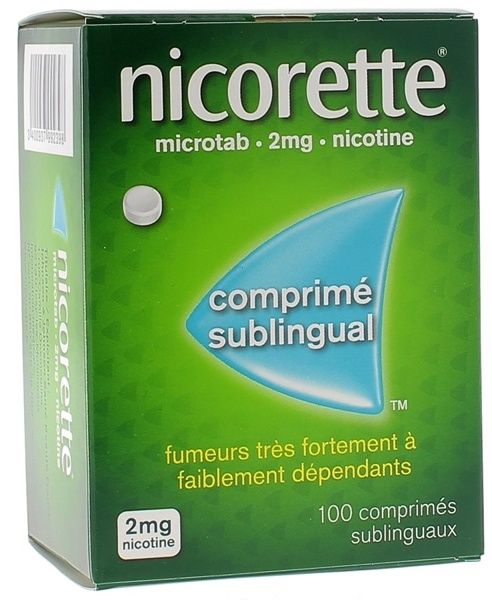NICORETTE 2MG MICROTAB 100 TABLETS
NICORETTE 2MG Microtab 100 Tablets
For warnings, precautions for use and contraindications, please consult the instructions for use.
Nicorette microtab 2mg of nicotine, box of 100 sublingual tablets, is recommended for moderately to weakly dependent smokers . This drug is indicated in the treatment of tobacco dependence in order to relieve the symptoms of nicotine withdrawal in subjects wishing to stop their consumption of tobacco. 2 mg chewing gum can be used as monotherapy or in combination with Nicorette transdermal patches (medical advice advised).
Reserved for adults (from 18 years old)
This medication can be used in :
- Cases where a smoker temporarily abstains from smoking,
- A strategy to reduce smoking as a step towards final cessation.
COMPOSITION:
Nicotine: 2 mg, as nicotine bitartrate dihydrate
Excipients: betadex, crospovidone, magnesium stearate, anhydrous colloidal silica.
DOSAGE
- For immediate cessation for a smoker with less than 20 cigarettes / day: 1 tablet every 1 to 2 hours. 8 to 12 tablets / day. Gradually reduce the number of tablets and stop when consumption is 1 to 2 tablets / day.
- For immediate cessation for a smoker with more than 20 cigarettes / day:
Follow the same steps as for smokers with less than 20 cigarettes per day taking 2 tablets per dose.
Place the tablet under the tongue to allow the slow and steady absorption of nicotine through the blood vessels of the tongue. The tablet dissolves for about 30 minutes.
Do not chew or swallow the tablet. Maximum 30 tablets per day
CONTRAINDICATIONS
- Hypersensitivity to nicotine or to any of the components of the sublingual tablet.
- Recent myocardial infarction (within the last three months).
- Unstable or progressive angina.
- Angina of Prinzmetal.
- Severe heart rhythm disorder.
- Recent stroke.
Sublingual route
Read the instructions carefully
WARNING
This medication should not be used in children under 18 years of age without prior medical consultation.
The use of these tablets must be accompanied by a cessation of smoking.
Precautions are necessary in case of severe heart disease, hypertension , stomach ulcer or duodenum , hyperthyroidism , pheochromocytoma , diabetes , renal or hepatic insufficiency or arteritis of the lower limbs. In these situations, a prior medical consultation is essential before using this medication; a cessation of smoking without substitution treatment may be necessary.
Do not use other medicines containing nicotine, including transdermal patches (see below).
Do not leave this medicine in the reach of children: it may cause serious accidents.
DRUG INTERACTIONS
The products contained in tobacco smoke can accelerate the rate of elimination of certain drugs, especially theophylline. When smoking cessation, these drugs can see their effect strengthened and signs of overdose may appear. Contact your doctor in case of any doubt.
PREGNANCY AND BREAST-FEEDING
Pregnancy :
Smoking in pregnant women may cause fetal growth retardation. Stopping tobacco is always desirable. In women who are highly dependent on nicotine, the use of this medication may be an aid, but the effects of nicotine alone on the fetus are poorly understood. This drug has the advantage of not exposing the fetus to other toxic substances present in tobacco smoke. In summary: if the ideal is not to smoke and not to expose the fetus to nicotine intake, the use of this drug is a lesser evil compared to tobacco.
Breastfeeding:
Nicotine passes into breast milk, and breast-feeding is not recommended during treatment.



